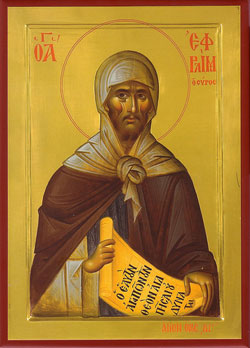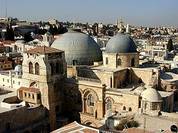
.
St. Ephrem (or Ephraim):
"Lyre of the Holy Spirit"
Born into a Christian family the fourth century in Nisibis, in Syria, St. Ephrem (306-373) was baptized as an adult and became a teacher. Known for saintly qualities he was ordained to the diaconate before the year 338 A.D., serving four bishops of Nisibis.Some believe he later became a priest.
We know little about his life except for his beautiful hynms, written to combat the many heresies prevalent at the time. He used these songs to communicate the truths of the faith. The originality, imagery, and beauty of his hymns captured the hearts of the Christians so much so, that Ephrem is credited with awakening the Church to the value of music and poetry in spreading and fortifying the faith. Here is one of his beautiful hymns about Mary that compares her with Eve:
Mary and Eve in their symbols resemble a body, one of whose eyes is darkened and blind,
while the other is bright and clear, providing light for the whole.
(Hymns on the Church, XXXVII.4).
In her virginity Eve put on leaves of shame, but Your mother has put on
in her virginity a garment of glory that encompasses all, while to Him who covers all
she gives a body as a tiny garment.
(Hymns on the Nativity, XVII.4).
A Chariot of flesh did Mary become, enabling her to escort the Fiery One in her bosom.
The angel stood amazed at the Daughter of Man as she carried the Lord of all humanity.
(Hymns on Mary, XVI.1; Bride of Light, p.99).
He was a prolific writer, using a variety of poetic forms and writing in Syrian, winning the title "lyre of the Holy Spirit." He was said to have received his diaconate from St. Basil in Cappadocia and to have been an influence on him despite his short visit there. He battled against Manichean, Marcionite and Aryan heresies.
Sometime in 364 he settled on Mount Edessa living as an ascetic, writing at Edessa (what is now Urfa) 100 miles east of his home. "The soul is your bride, the body is your bridal chamber..."
Writing on the profundity of Holy Scripture he says: "Lord who can grasp all of the wealth of just one of your words? What we understand is much less than we leave behind, like thirsty people who drink from a fountain. For your word Lord has many shades of meaning, just as those who study have many different points of view. The Lord has colored his word with many views so that each person who studies it can see in it what he loves. He has hidden many treasures in His word so that each of us is enriched as we meditate on it. The word of God is a tree of life that from all its parts offers you fruit that is blessed. It is like that rock opened in the desert that from all its parts gave forth a spiritual drink." He who comes into contact with some share of its treasure should not think that the only thing contained in the word is what he himself has found. He should realize that he has only been able to find that one thing from among many others. Nor because only that one part has become his should he say that the word is void and empty and look down upon it. But because he could not exhaust it, he should give thanks for it riches and be glad that you were overcome and do not be sad that it overcame you. The thirsty man rejoices when he drinks and is not downcast because he cannot empty the fountain. Rather let the fountain quench your thirst then have your thirst quench the fountain because if your thirst is quenched when the fountain is not exhausted, you can drink from it again whenever your thirsty. But if when your thirst is quenched the fountain also is dried up, your victory will bode evil for you. So be grateful for what you have received and don't grumble about the abundance left behind. What you have received and what you have reached is your share and what remains is your heritage. What at one time you were unable to receive because of your weakness, you will be able to receive at other times if you persevere. Do not have the presumption to try to take in one draft what can not be taken in one draft and do not abandon out of laziness what you may only consume little by little."
Prayer: St. Ephrem, lyre of the Holy Spirit, who put music and poetry in the service of God, pray for us and intercede for us that we might receive the gifts of the Holy Spirit to enrich our ministry and deepen our faith.
 RSS Feed
RSS Feed

